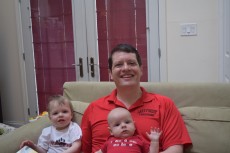New assistant professor Zachary Cook
 Zach Cook and Children
Zach Cook and Children
Who is Zachary Cook?
Greetings! I grew up in Louisiana, one of the only states that can rival Illinois for its colorful politics. I attended Jesuit High School in New Orleans, where the only professional baseball team I could watch growing up were the Cubs on superstation WGN. So I became a local sports fan long before I moved to Chicago to pursue my doctorate in political science at Northwestern. Teaching politics has always been my favorite part of being an academic. For the past twelve years I have taught Chicago politics, the presidency, parties and elections, the U.S. Congress and campaign finance at DePaul University. At DePaul I have also worked to introduce students to local elected officials and to set students up with opportunities for political internships throughout the city and state. I have worked on a couple of different campaigns at varying levels of Illinois politics, the names of which I will not disclose in an attempt to conceal my biases. At Lake Forest College I will also be offering a course on research methods.
I can date much of my career interest in politics back to growing up in Louisiana in the 1980s. My home state went through a deep recession in that decade. In that climate of economic anxiety, a white supremacist and former Ku Klux Klan Grand Wizard named David Duke ran on a message of racial division for the Louisiana state legislature. Duke ran in the district I grew up in. I remember him knocking on my door one day. I assumed at the time, “There is no way the voters would select someone like Duke to represent them.” But Duke did win a state legislative seat in 1989. The next few years for Louisiana were chaotic, as Duke kept running (and kept losing, but narrowly) for U.S. Senate and for governor. The whole experience taught me early on that nothing is guaranteed in American politics, and that bad men can win power if the people are not vigilant.
Public opinion is one of my main scholarly interests. My doctoral dissertation investigated why there are currently large gaps by age in American elections. Why are younger Americans less likely to support Republican candidates than older Americans are? I investigate this subject by looking back throughout American history and trying to find any common patterns that set “younger Americans” apart from the general population. I have published two articles on the subject in the journal The Forum, and I am finishing my first book project on the subject, tentatively titled Is America’s Youth Vote Liberal? The history of the presidency and presidential campaigns is another scholarly interest of mine. My most recent article, “Measuring Partisan Regimes,” was published last December in the journal Presidential Studies Quarterly. It looked at how partisan coalitions build up the reputations of presidents sometimes considered “great,” to further their own political motivations.
My non-scholarly interests include rooting for the Cubs, singing (I was an a capella director in college), science fiction and fantasy, keeping tabs on the local Chicago political scene, and raising my sons Samuel and Benjamin with my wife Karen. Teaching politics at a small liberal arts college has always been a dream aspiration. I am looking forward to starting up at Lake Forest.